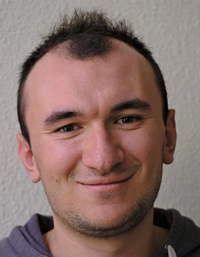Morgan RUSINOWICZ received the 2023 Academic Thesis Prize for his research work among PhDs graduating in 2022.
Thesis Title: Mechanical and electrical properties of dielectric thin films: electrical-nanoindentation experiments and numerical simulations.

Advanced devices (microelectronic systems, sensors, power sourcing or storage, photovoltaic cells, …) are complex architectures at small scales that integrate ever more heterogeneous stacks of thin films combining metals, semiconductors and dielectrics. Each material has the role of ensuring one or more functions for several years (signal transmission, energy conversion, insulation, …) of which the most common are based on electrical conduction and dielectric properties. However, the functional reliability of devices is largely driven by the mechanical strength of these materials to the harsh stresses occurring both in the fabrication process and during operation. Knowing the local mechanical and electrical properties of thin film materials, but also their potential interaction, is therefore a major challenge.
In this context, the present PhD thesis consists in identifying the mechanical and electrical behaviors of three functional systems composed of dielectric thin films on conductive substrates. The characterization of these systems was performed by electrical-nanoindentation tests, coupling fine electrical measurements to nanoindentation tests. The treatment of the experiments, not being straightforward nor trivial for a quantitative approach, has been carried out essentially by using numerical simulations by the finite element method in order to extract material properties.
The first system studied is a silicon nitride layer on an aluminum-based alloy (Si3N4/AlSiCu). Its indentation led to the cracking of Si3N4 and to instabilities on the mechanical curves. From these features, a methodology based on the energy dissipation caused by the fracture has been developed, giving both an identification procedure of the damage properties of the brittle layer and the whole cracking scenario (location of the cracks, their shape, their length, etc.).
The second system is a nanoporous organosilicate glass thin film on a silicon substrate (SiOCH/Si). Its electrical indentation resulted in plastic deformation of the film, its cracking and electrical leakage. The correlation between mechanical and electrical failures has been fully described according to several regimes, one of which proved particularly interesting for identifying a conduction law of the SiOCH film under stress. Indeed, a plasticity-driven conductivity drop in the dielectric material has been clearly evidenced. An extension of the Poole-Frenkel conduction model was then proposed to account for plastic strain, and was supported by a physical mechanism.
The third system is a copper oxide thin film obtained from the thermal oxidation of an annealed copper substrate (Cu2O/Cu). The mechanical behavior of the oxide, but also that of the copper substrate, was first fully described. In particular, scaling effects already well known in crystalline metals (onset of plasticity, plasticity gradients) have been observed to be exacerbated in copper by the growth of an oxide layer on its surface. The fine description of the system rheology made it possible in a second step to determine its electrical properties.
Finally, these results are of both academic and application interest. In addition to gaining a better understanding of the functional systems studied, which are at the heart of modern microelectronics, they are probably generic enough to be transposed to other similar systems.
Key Words: nanoindentation, finite element method, thin films, mechanical damage, electrical conduction,thermal oxidation
Doctoral School: ED I-MEP² - Engineering - Materials, Mechanical, Environment, Energetics, Processes, Production
Research laboratory: Science et Ingénierie des Matériaux et Procédés (SIMaP - CNRS/Grenoble INP-UGA/UGA)
Thesis supervision: Muriel BRACCINI and Fabien VOLPI
>
To find out about all the 2023 thesis prizes